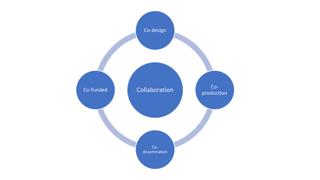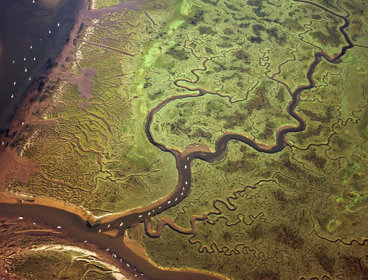Collaboration is essential for many successful fieldwork projects. Ethical issues need to be considered whenever people are working together, whether this be within a small team of a few people from the same country, through to large projects with international collaboration and communities and stakeholders involved.
Inadequate consultation with local collaborators from the outset may compromise the research, mean key local knowledge is missed, with inadequate attention to local sensitivities and priorities, or the research not providing real value to the field site or local community.
Collaboration should sit throughout the lifecycle of a fieldwork project, from the design phase, to applying for funding, through to the data collection, review and interpretation, dissemination of findings, and through a framework to ensure long-term local benefit and positive impact.

Inclusive fieldwork and equality impact assessments
Fieldwork should be planned and conducted in such a way as to be as inclusive and accessible as possible for all those taking part; team members, collaborators and participants, considering their wellbeing, including their mental and physical health, and all other protected characteristics.
An Equality Impact Assessment should be undertaken to help build equality into a project from the outset. Some key elements which should be considered in such an assessment and how these can be mitigated, can be taken from the , and include:
- Local laws, customs and attitudes, and their potential impact on those with protected characteristics
- Accessibility of locations
- The timing of a trip (this may be adjusted to account for those with caring responsibilities)
- Accommodation
- Catering
- Transport
- Equipment and clothing
- Itinerary, accounting for rest breaks, meals, finish times and toilet stops
- Provisions for disclosure
It is important to note that impacts might not be the same for all involved.
Questions to think through
- Have you engaged and worked with project partners from the outset of your planning?
- Have project partners been involved in setting the research agenda, questions, aims, objectives, methodologies and plans for interpretation, dissemination and impact?
- Are local partners jointly leading funding bids?
- Does your project present value to the field site and the local and wider community which occupies it (researchers, residents, policy-makers)?
- Does your project reflect local needs in some way, or only external agendas?
- Are your partnerships equitable with appropriate balances of power and fair division of responsibility and labour?
- Are roles clearly established and equally respected?
- Are all collaborators and facilitators appropriately paid and compensated?
- Have you built capacity into the project to ensure this is all the case?
- When working within Indigenous communities, have you appropriately called up and valued Indigenous expertise and knowledge?
- Have you taken active steps to engaged positively with local communities, for example learning any different language to show commitment and improve communication?
- Have you undertaken an Equality Impact Assessment?
Resources
The AIATSIS research ethics framework
Australian Institute of Aboriginal and Torres Strait Islander Studies (AIATSIS)
See page 9 for a useful research ethics framework and accompanying figure to consult when working with Indigenous communities, around the principles of Indigenous self-determination, Indigenous leadership, impact and value and sustainability and accountability.
Co-Creating Ethical Practices and Approaches for Fieldwork
Juliet Ryan-Davis and Daniella Scalice
This article discusses and presents ideas and recommendations surrounding equally valuing Indigenous and Western perspectives and knowledges, building relationships with Indigenous communities, teaching ethical sampling protocols, and implementing sharable sample archives.
Relationally Approaching Fieldwork: Using Indigenous Methodologies as Ethical Practices in the Context of Human Participant Research
Dr Nathan Durdella
Seven points to consider to help take a relational approach to a project and its methodology, to prioritise relationships between researchers and communities.
Global Code of Conduct for Research in Resource-Poor Settings
TRUST
For all research stakeholders with guidance to counter ‚Äėethics dumping‚Äô in lower income settings (the export of unethical practices from high income to lower income countries). The resource is presented as clear, short statements, focusing on research collaborations that entail considerable imbalances of power, resources and knowledge, using a framework based on the values of fairness, respect, care and honesty.
Doing Global Science: A Guide to Responsible Conduct in the Global Research Enterprise
IAP ‚Äď the Global Network of Science Academics
An accessibly written guide providing practical guidance on undertaking research in a global setting ‚Äď including topics on international collaboration, public communication and working responsibly.
An inclusive risk assessment tool for travel and fieldwork
Michael Prior-Jones, Jennifer Pinnion, Marc-Alban Millet, Elizabeth Bagshaw, Ake Fagereng, and Rhoda Ballinger
A useful introduction to topics of protected characteristics and discrimination within the content of fieldwork, with an example risk assessment including considerations around cultural risks and attitudes towards protected characteristics.
How to undertake an equality impact assessment
London School of Economics
Although within the context of higher education, this resource provides a general background to Equality Impact Assessments and a useful which could be applied to a field research project.
Equality Impact Assessment Guidance and Template
UKRI
Guidance of how to complete an Equality Impact Assessment, with a useful example template. Although the example is within the context of a funding bit, the framework and questions asked could be applied to a field research project.
Inclusive field trips
University of Leeds
Bullet points providing general advice on designing and delivering inclusive fieldtrips. The resource is within the context of higher education teaching, however important points around destinations, activities, logistics and disclosure are relevant to all those planning field research and should be considered when doing an Equality Impact Assessment.
Fieldwork principle 4: asccessible and inclusive fieldwork
Royal Geographical Society (with IBG)
Further useful resources around topics of planning accessible fieldwork, disability and fieldwork, and protected characteristics.
The Society does not take responsibility for the content of external sites. Inclusion on this page does not equate to an endorsement of any content or organisation. Please contact the external site for questions regarding individual resources.


